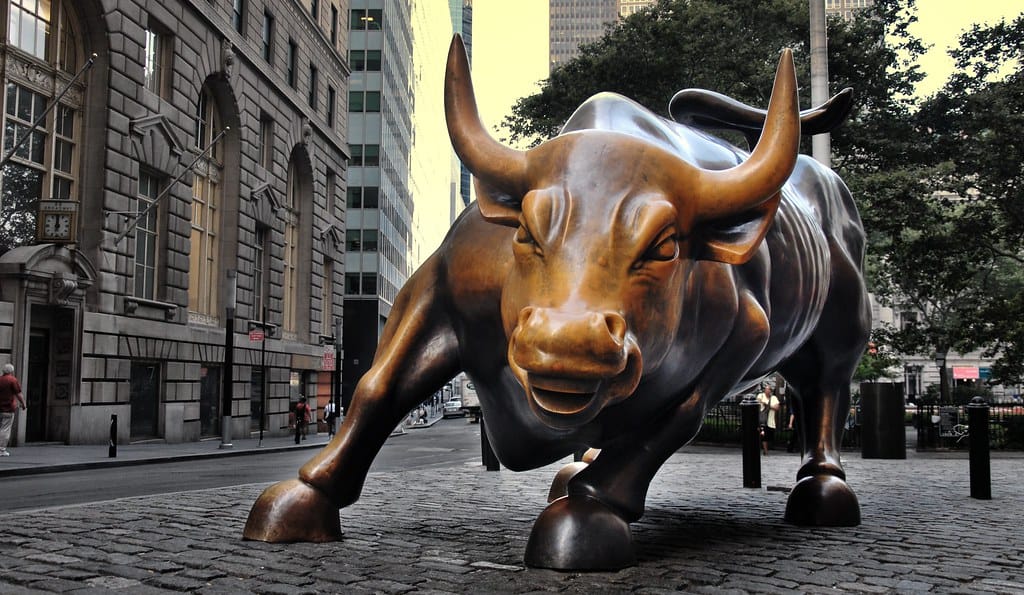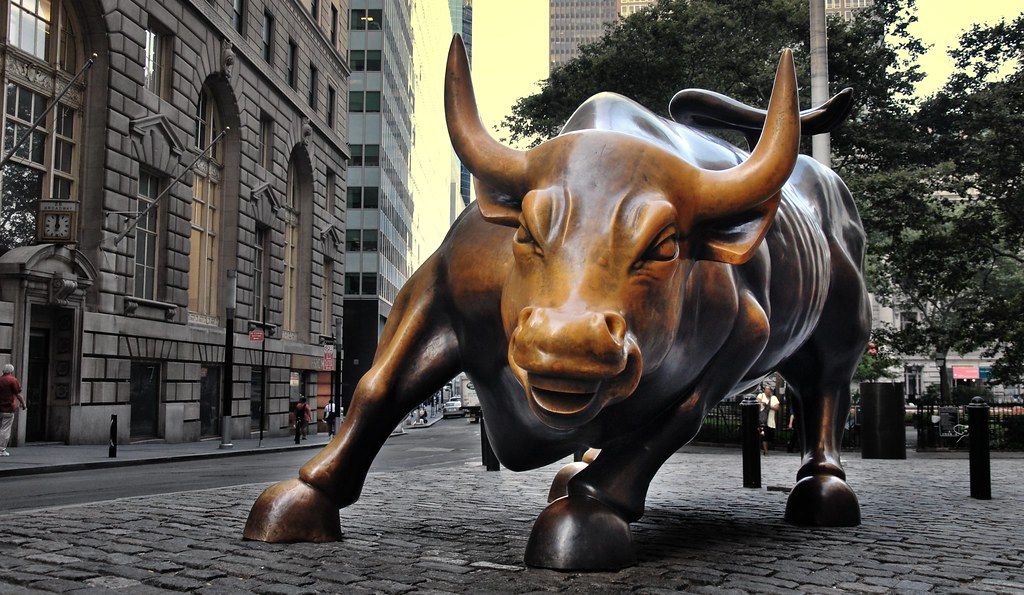The Amherst to Wall Street Pipeline
Staff writer Andrew Rosin ’25 addresses the culture of selling out into finance, reminding students of their potential to bring Amherst’s interdisciplinary principles to Wall Street.


Two years ago, 20 percent of Amherst College’s senior class planned to work in financial services after graduating. That equates to roughly 90 out of the 452 seniors. This figure dwarfs the other post-grad outcomes; for reference, 11 percent of the graduating class planned to work in consulting, and only 4 percent of the graduating class planned to work in law.
For most students, this statistic probably isn’t surprising; however, Amherst students are arguably less likely to know who these students are and why they’re going to work on Wall Street. While there’s research that theorizes why finance appeals to elite college students, it’s worth asking why students here at Amherst are so likely to choose careers in finance. And then there’s the question that to many students will sound paradoxical: can you create meaningful change while working on Wall Street?
There are myriad reasons why students gravitate toward Wall Street, from the size of the industry to its quick return on investment, fast-paced work environment, and, of course, the salary. The average salary for a first-year investment banking analyst is somewhere between $170,000 and $190,000. The salary does draw students to Wall Street, like Sona Kim ’22, whose goal is FIRE: Financial Independence, Retire Early. Kim hopes to retire by the age of 30 with the money she makes on Wall Street.
Stephanie Hockman, director of the Traub Center for Careers in Business and Finance, argues that individuals should be “compensated for the value they add to a company.” However, it’s hard to justify the six-figure salaries when the average salary of a public school teacher in Amherst, for example, is only around $63,000. Hockman explained that the disparity in salaries is a “factor of government” and that “without finance, we don't have an economy that moves.” However, she also noted that “educators should absolutely be paid more.”
It’s also important to recognize that money means different things to different students, as international student Sushan Bhattarai ’23 notes. Because Amherst provides generous financial aid to low income students, he argues, there is a cohort of students at the college for whom Wall Street is a means of “securing economic freedom.” For international students, too, Wall Street provides a pathway to “bureaucratic freedom.” Working at a reputable Wall Street firm increases the chances of obtaining a visa for those who are not naturalized US citizens.
The second most commonly cited reason for pursuing a career on Wall Street is job security. In the finance industry, it’s most common to work, after graduating, with the company you interned with during your junior summer. Junior summer internships are decided during candidates’ sophomore year, so students going into finance could already be guaranteed a post-graduation job by their sophomore year. Emily Griffen, director of the Loeb Center, noted that students “could walk into their senior year, job in hand, and they don't have to stress or get bent out of shape over this. They can actually just focus on their senior year.”
Overall, the finance track has more of a defined playbook than the government or nonprofit paths. “Going into these other fields, the pathway looks a little bit more opaque, it's a little bit more ambiguous,” Griffen said. “The timeline can make you feel really insecure.” She also noted that nonprofits have less resources and money to recruit students.
While Griffen argues that “when you really look at what the Loeb Center resources are, it's actually very small, proportionately, for business and finance,” students perceive the Loeb Center’s presence differently. Necati Akinci ’25, for example, described the Loeb Center as “finance-oriented,” and at the end of the day, the Loeb Center does a good job of connecting finance students with career opportunities. Amherst offers programs like Hockman’s eight-week Introduction to Finance series, for example, which provide students with a foundation for careers in finance as first- and second-year students. Hockman runs an identical workshop for consulting, and it makes sense that consulting is the other big — and growing — post-grad outcome for Amherst seniors.
Athletes have access to an additional set of resources to help them find work on Wall Street. Through generations of student-athletes graduating and going to work on Wall Street, finance networks have become ingrained within Amherst’s sports teams. Upperclassmen can facilitate mock interviews for underclassmen, and graduates can give you referrals for real interviews. As first-year lineman for the football team Jack Nagy ’25 explained with regard to networking, “You just want to find those common experiences that you have with Amherst alums and football definitely makes that easier. You can just go in the alumni directory and [filter] extracurriculars [for] football and boom. You’ve got a list of hundreds of people that are in the finance industry that are pretty willing to help you out.”
To return to the question of why students pursue careers on Wall Street, one cannot overlook students who find markets and investing, as a discipline, to be genuinely interesting. Somewhat paradoxically, the throughline for many of these students is that they have a passion outside of finance. Akinci originally wanted to be an aerospace engineer and plans on majoring in physics, but he says that he gravitates towards the quantitative side of investment banking because of its intersections with pure science and the ability it affords to solve important financial problems.
Bhattarai, who’s an environmental studies and history major, is interested in sustainability and feels like Wall Street is where he can have the biggest impact in that area — as opposed to working in politics and policy. “While policy is more at the meta level, and setting up the regulations for things to succeed, market actors actually have the power to make some of these things succeed. … [Investment banks] are also now being driven to make profits on green energy and create green bonds. And, for example, there’s now offshore farms that are going to become offshore wind farms outside of New York,” Bhattarai highlighted.
Students and faculty alike commented on the diverse skill set that employees gain on Wall Street. These skills can be applied to careers in different, less finance-oriented fields, Bhattarai emphasized: “Versus Wall Street being that inner bubble where you have to go from Goldman Sachs to JP Morgan, know that you can go from Goldman Sachs to the World Bank, you can go from the World Bank to the World Wildlife Fund, you can go from that to starting your own shoe company. Those are skills that are transferable. Wall Street itself is temporary. And that’s how you should look at it.”
However, Bhattarai worries that “the conversation kind of stops at, ‘You go to Wall Street, and you’ve made it.’” Students frequently talk about the skill set one learns on Wall Street and the connections they’ll make, but hardly anyone talks about life after Wall Street. It’s unclear, therefore, how many students have a clear vision of where their Wall Street skills will take them. “We talk a lot about transferable skills, but nobody really tells you what transferable skills you get out of Wall Street,” says Bhattarai.
On the flip side of this thoughtful, long-term approach to finance, the image of the finance bro is omnipresent on college campuses. “[Finance bro] brings to mind a sense of laziness, maybe like not caring about academic pursuits or the things that Amherst prides itself upon, like learning something just for the sake of learning,” Akinci reflected.
Bhattarai seconded Akinci’s assessment of finance bros: “Because there’s so much pressure put on finance bros, or students that from freshman year onwards are driven to get into Goldman Sachs or JP Morgan, they forget — or they don’t want to indulge in — the more creative pursuits within the liberal arts.”
Bhattarai finds that finance bros are unable to engage in conversations outside of the world of finance. They choose to ignore the social, cultural, and political complexities of the profession and of the world. “[Finance bros] are so bent on going into finance that they put a wall around them, and they dig up a moat where the only thing they can talk about is finance,” Bhattarai says.
Finance culture’s pitfall is that it can consume an individual's identity and serve as blinders obscuring the outside world. There’s more to life than markets, investing, and money. When you’re on Wall Street, it’s easy to perceive the world through this narrow lens of finance. But if you do, you’ll end up neglecting the values of curiosity, creativity, and knowledge that define Amherst. You’ll violate one of Amherst’s core principles: to engage the world around you.
It’s critically important to situate finance within larger social, political, and systemic issues. People who work in finance have to actively cultivate an awareness of these issues. Finance or Wall Street are not categorically bad; however, it’s easy and it’s common to get caught up in the world of finance and abandon the elements of it that do have value. Students who work in finance have a responsibility to live up to certain standards as citizens of the world, even if their career doesn’t specifically ask it of them.
Bhattarai embodies this nuanced conception of finance. “I think what people often don’t realize with the markets and investment banking in general is that it’s a very big force in how policy is driven…Goldman Sachs now has a group dedicated just to sustainable finance. And they want to invest $750 billion by 2030,” he explains. But Bhattarai also admits, “I completely disagree with exploiting people halfway across the world and building factories to generate profits when people are suffering. Wall Street can be used as a mechanism to create investments that will help communities and help our transition away from an economy that’s based on capitalist exploitation. But there are bits of it that I completely disagree with.”
Part of being a globally conscious employee in the finance industry involves reckoning with just how harmful the finance industry can be. Only from this reckoning can Amherst students help nudge Wall Street in the direction of progress, equity, and justice.
If you have thoughts on this or any of our articles, comment below or send us a letter by using this form or emailing [email protected].


Comments ()